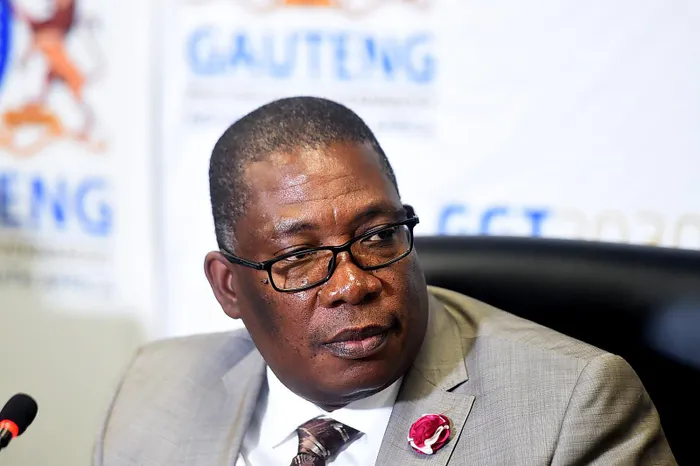Political analysts say Lesufi is tapping into anti-migrant sentiment to influence 2026 elections

Gauteng Premier Panyaza Lesufi has come under scrutiny for his tough stance on informal settlements, with analysts saying he is appealing to anti-migrant sentiment ahead of the 2026 elections.
Image: Itumeleng English/Independent Newspapers
Gauteng Premier and ANC leader Panyaza Lesufi's recent stance is perceived by political analysts as an attempt to attract voters with growing anti-migrant sentiments, echoing groups like Operation Dudula. This strategy comes as the ANC's support wanes in anticipation of the 2026 local elections.
This comes from Lesufi's announcement that the provincial government plans to demolish illegal informal settlements, with a particular focus on those occupied by undocumented foreign nationals.
Speaking at a media briefing in Johannesburg on Wednesday following the Gauteng Executive Council (Exco) meeting, Lesufi raised concerns over the rapid increase of informal settlements across the province, saying that they would be demolished in the early hours, at 2am. However, he did not specify a date.
He revealed that more than 400 new informal settlements had recently emerged in Gauteng.
“Partnerships with municipalities will be strengthened, and proactive measures will be taken to halt further land invasions while ensuring lawful settlement development,” he said.
Lesufi said there was a newly established informal settlement in Ennerdale, built over a weekend, as part of a growing trend.
“The pattern is clear: identify land owned by the government, send a few people, and after 72 hours - once there’s no eviction - invite everyone who needs land to occupy it,” he said.
“We are tired of this government now.”
Speaking to IOL News, political analyst Professor Ntsikelelo Breakfast said Lesufi’s comments cannot be separated from political strategy, especially given the ANC’s declining influence and the rise of anti-immigrant movements such as Operation Dudula."
“While one cannot rule out genuine concerns, the timing and tone raise questions,” Breakfast said.
“The ANC has traditionally taken a softer approach on this issue, but changing dynamics have forced a rethink.”
Breakfast said that parties like the Patriotic Alliance (PA), ActionSA and the African Christian Democratic Party (ACDP) have gained traction by embracing hardline stances on undocumented migrants, positions that have resonated with working-class communities feeling left behind.
“Whether it’s true or not, economically, the working class blames foreign nationals for unemployment and poverty,” he said.
“There’s clearly a message resonating on the ground, and the ANC knows it.”
Breakfast said that even Julius Malema and the EFF, historically outspoken Pan-Africanists, appear to be softening their messaging on immigration due to grassroots pushback.
“Malema once framed borders as colonial constructs, calling South Africa a branch of Africa. But now he’s adjusting that message. The political climate is shifting, and the ANC - and others - can’t ignore that if they want to survive,” he said.
When asked whether Operation Dudula could gain traction if it contested the elections in Gauteng, Breakfast said it would, however said that he was not endorsing the movement.
“I can bet my bottom dollar they will garner votes,” he said.
“They’ve gained strong support at the grassroots. That’s the reality - even if I don’t personally endorse them.”
Asked if Lesufi is using state resources to push a softer version of Operation Dudula’s anti-immigration agenda, Breakfast said,
“Of course, one might ask: why now? But the reality is you can’t have a country where people are unaccounted for. Even in Europe, immigration is strictly controlled. The mismanagement of South Africa’s borders has consequences - on healthcare, education, and basic services.”
Lesufi’s comments come days after the IFP’s MMC for Human Settlements in Johannesburg, Mlungisi Mabaso, echoed similar views.
Addressing leaders in Freedom Park, Mabaso said the city would not use South African taxpayers’ money to service informal settlements largely occupied by foreign nationals.
Breakfast said the ANC is unlikely to perform well in the 2026 elections, not just because of immigration issues, but due to broader dissatisfaction with service delivery.
“There is a strong link between poor service delivery and declining electoral performance,” he said.
“In the past, voters supported liberation movements. But younger voters are disillusioned. They’re not voting based on history - they want results.”
Breakfast said that youth, facing economic hardship, are increasingly demanding accountability.
“Young people are tired of excuses. They want development. The ANC hasn’t done enough to benefit the majority since 1994. While some progress has been made, much more could have been achieved.”
Another political analyst, Professor Theo Neethling, also chipped in, echoing Breakfast’s concerns, saying Lesufi’s focus on undocumented foreign nationals appears less about urban planning and more about political positioning.
“This shift carries populist undertones. It seems intended to align with rising anti-immigrant sentiment, especially with the 2026 elections approaching,” Neethling said.
He pointed out the growing influence of Operation Dudula and similar movements, saying Lesufi’s rhetoric reflects the pressure the ANC is under in Gauteng.
“The ANC is struggling, while the PA and IFP are capitalising on public frustration. This could be an attempt to recover lost ground, but it also raises concerns about fuelling xenophobic sentiment.”
Meanwhile, Breakfast added that anti-immigration messaging is likely to dominate the political agenda going into the next election cycle.
“There’s a clear shift towards hardline immigration policies across the board. It’s becoming a political battleground - and no party can afford to sit on the fence anymore,” he said.
simon.majadibodu@iol.co.za
IOL Politics